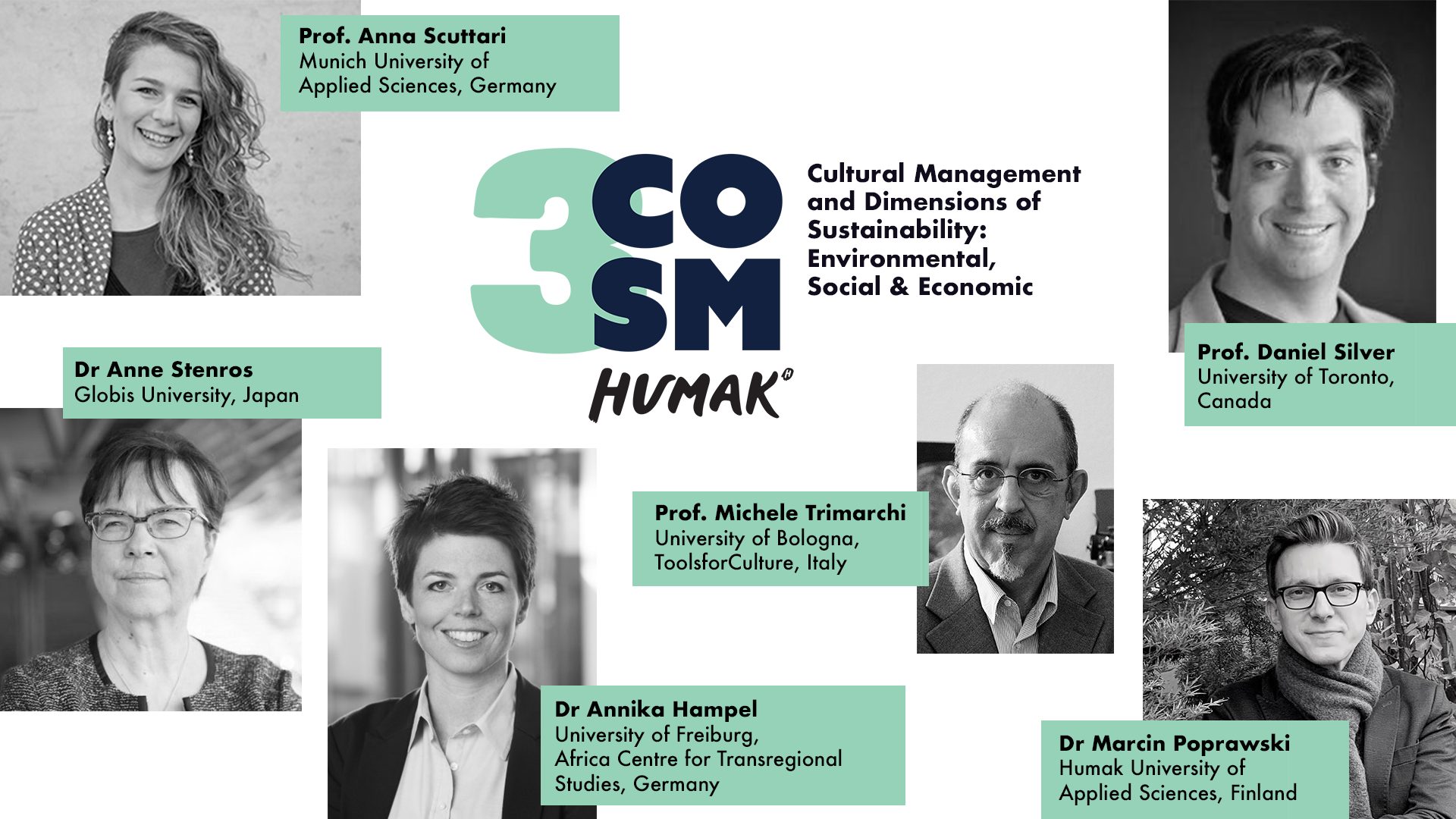COSM Brings Culture and Sustainability Experts Together
Culture, Organisation & Sustainability Management, COSM for short, is a series of courses that aims to shed light on the why’s and how’s of sustainability in cultural organisations. COSM consists of three courses, each focusing on different aspects of culture and sustainability. The courses are connected by the central idea of exploring new and sustainable ways to develop cultural industry and creative processes.
COSM3: Cultural Management and Dimensions of Sustainability: Environmental, Social & Economic
This master’s level course is aimed for people interested in questioning the answers regarding cultural organizations and cultural professionals’ role in balancing their cultural ecosystems. During the course you get to take part in webinars and discuss culture and sustainability with established professionals. The quest speakers for COSM3 are illustrated on the picture below.
Cultural Management & 3 Dimensions of the Sustainability: Environmental, Social & Economic (COSM 3) is the 3rd course of the module on cultural management and sustainability values, engaging the expertise from research areas of sustainability. Its aim is to acknowledge, adapt and strengthen the role of cultural managers in supporting the general sustainability movement, impacting people’s and industries’ pro-ecological behaviours, assisting all types of attempts to make our life on Earth more sustainable, ethical, responsible or balanced – in environmental, social and economic sense. And, finally this part of the module is also focused on questioning the answers regarding cultural organizations and cultural professionals’ role in balancing their cultural ecosystems.
The aim of COSM3 is for students to be able to acknowledge, adapt and strengthen their role as cultural managers in supporting the general sustainability movement, impacting people’s and industries’ pro-ecological behaviours, assisting all types of attempts to make our life on Earth more sustainable, ethical, responsible or balanced – in environmental, social and economic sense.
Learn about the different aspects of sustainability, such as its social dimensions and inter-generational aspects, cultural tourism and public health policies. Read more: cosm.humak.fi and sign up for COSM3 here.
COSM Talks is a Think Tank for Industry Professionals
COSM Talks are live events where industry professionals are brought together to discuss the current state of cultural management. The idea is to find out how we can improve the process through our actions. The attendees of the first COSM Talks live event included Jonathan Vickery from the University of Warwick, Philippe Vandenbroeck from shiftN, Robert Knippschild from the Technical University of Dresden, Katriina Soini from LUKE Finland and Pekka Vartiainen, Oona Tikkaoja and Marcin Poprawski from Humak.
Watch the highlights of the first COSM Talks event below!
Culture as a Transformative Power
The first event tackled themes such as cultural production models and the narrative framework of cultural sustainability. The idea is to reframe cultural management in terms of sustainability and rediscover the meaning of cultural management through sustainability values. That can be done by examining how cultural producers narrate what they do and what impact they have on local communities.
“Sustainability is an unresolved kind of problem which has been taken over by climate change scientists and other urgent kind of future disaster predictions which are very important, and we all need to be concerned. But at the same time, it’s eclipsing a lot of questions over local life and cultural production. There’s an urgent issue there and it’s urgent to address the lack of cultural management and production frameworks that really can provide intellectual leadership in sustainability”, says Jonathan Vickery.
Culture can be viewed as a transformative power for sustainability. Art provides content for the narrative of cultural management and sustainability. The key is to start by examining what can realistically be done in our everyday lives to undo the unsustainable until sustainability values become the new norm.
Cultural Managers co-creating a better future
It’s important to understand the role of a cultural manager in relation to the process of social learning. A cultural manager works as a sort of social architect. They co-create conditions that encourage idealism and incentivizes people and communities to build a better future. This creates a space where we are more in contact with the world around us. That way we can can safely question our assumptions and be more open to feedback.
There’s a huge need for cultural managers and producers who can integrate local development with high level contemporary practice.
Humak’s aim is to create more equal societies by developing competencies that unify people. Given the potential to tie up arts and cultural management there is enormous potential to develop a powerful synergy between the two. COSM began with the idea of looking outside the box of culture management. The good thing about cultural management as an academic field is that it’s open to different directions.
The idea behind COSM is exploring ways to undo the unsustainable in cultural management. Many creative processes are unsustainable in its core. The aim of the study modules is to find sustainable alternatives to these processes. The courses start in January 2021, you can register for the courses through our web store. For more information, visit the COSM website.
2021-03-05 16:00:07
